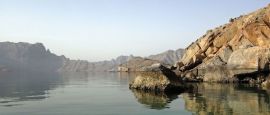Oman: Doing business & staying in touch
Doing business in Oman
Oman's business culture blends professionalism with strong traditional values. Meetings often begin with a friendly conversation before moving on to formal matters, so patience and courtesy are appreciated. Punctuality is expected, but flexibility is also common, particularly in scheduling follow-up discussions.
Handshakes are the usual form of greeting, though greetings between men and women may be more reserved depending on context. Business cards are exchanged politely with the right hand, and modest dress is essential — suits or long-sleeved shirts for men, and conservative business attire for women. Decision-making can take time, as consensus is valued, so maintaining a respectful and calm demeanour is key to successful negotiations.
Hospitality plays an important role in Omani culture. Offers of coffee, dates or refreshments should be accepted as a sign of respect, and conversations often include expressions of goodwill before business topics are discussed.
Oman's economy is diverse by regional standards, combining its traditional oil and gas base with growing investment in tourism, logistics and renewable energy. The government's long-term development strategy aims to reduce reliance on hydrocarbons and encourage private enterprise, innovation and sustainable industries.
For visitors, this translates into improved infrastructure — new airports, highways and ports — as well as a steadily expanding hospitality sector. Agriculture and fisheries remain important in rural areas, while Muscat serves as the country's commercial and financial hub. Economic stability and a focus on diversification make Oman one of the Gulf's more balanced and accessible destinations for travellers and investors alike.
Keeping in Touch in Oman
Mobile coverage in Oman is extensive, with strong signals across most urban areas, towns and major highways. Coverage can become patchy in remote mountain and desert regions, particularly in the Empty Quarter and parts of Dhofar. The main mobile operators are Omantel, Ooredoo and Vodafone Oman, all offering reliable prepaid SIM cards that include data, local calls and international packages.
SIM cards can be purchased at airports, official retail outlets and convenience stores. A passport is required for registration. International roaming is available, but local SIMs tend to offer much better rates for calls and data.
Internet access in Oman is fast and widely available in cities and towns. Most hotels, cafés and shopping malls offer free Wi-Fi, and 4G/5G mobile networks provide good coverage in populated areas. In remote desert or mountain locations, connections may be slow or unavailable, so travellers planning to visit these regions should download maps or key information in advance.
Internet use is monitored under local laws, and access to certain websites may be restricted. Visitors should avoid posting or sharing content that could be viewed as offensive to local culture, religion or politics.
Oman's media landscape is measured and formal, reflecting the country's conservative values. The main newspapers, television and radio stations are government-owned or regulated, though they include both Arabic and English-language outlets. The most widely read English newspapers include the Times of Oman and Oman Observer.
International news channels are available in most hotels, and online access to global media is generally unrestricted. Visitors should, however, avoid photographing military or government sites, and be cautious when discussing sensitive political or religious topics in public or online.








 You know where
You know where